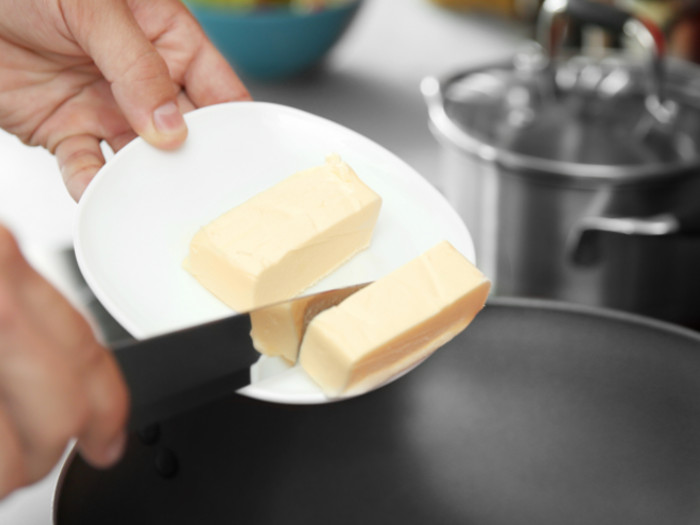Knowing your way around the best vegetable oil substitutes for baking will ensure that you remain the master baker in your kitchen, even when you’re missing such a key ingredient.
Vegetable oil sold commercially is usually a blend of palm, corn, and other industrial cooking oils. It is used in many baking recipes to add fat without additional flavor. Vegetable oil also has a high smoke point, so it will resist burning and won’t cook-off. It is a common pantry staple around the world and readily found at most grocery stores. [1]
Vegetable Oil Substitutes for Baking
The best reason to use vegetable oil substitutes for baking is if you’re trying to reduce the fat in a recipe. However, sometimes you just want to whip up some chocolate chip cookies, but don’t have vegetable oil in the cupboard. Whatever the situation, these ingredients are great alternatives, healthy or not.

Vegetable oils are low in saturated fats. Photo Credit: Shutterstock
Shortening
Shortening is simply vegetable oil that has been hydrogenated into a semi-solid form. It is one of the best vegetable oil substitutes for baking if you have it. Several commercial brands are sold regularly in the baking section. Shortening is flavorless and should be melted before using to ensure that you are using the correct liquid amount called for in the recipe.
Margarine
Margarine is another product that is already primarily made of vegetable oil and therefore makes a great substitute. The only difference is that margarine has been formulated to taste like butter, so it may add a buttery flavor to the recipe. Melt it down before using it for liquid accuracy. [2]
Butter
Butter is high-fat milk solid, and when used instead of vegetable oil, it will produce a creamy, rich texture in baked goods. In fact, many people prefer to use butter instead of hydrogenated vegetable oil, which provides a slightly stronger structure and great flavor. This is not a great substitute for other vegetable oil uses though, like grilling and frying, as the butter has a much lower smoke point than vegetable oil. [3]

Butter makes everything better! Photo Credit: Shutterstock
Yogurt
Plain unsweetened yogurt works well as a healthy substitute for vegetable oil when baking cakes or brownies. You can substitute for a 1:1 ratio for any recipe. Yogurt helps provide the moisture and if you use a full-fat version, it will also provide the fat.
Applesauce
This alternative to oil shows up in many healthy eating recipes, as well as vegan, plant-based recipes. Applesauce is low-fat but provides all the moisture of the oil. However, without another source of oil in the batter, your baked goods may turn out dry. Half applesauce, half oil is a great combination to cut calories without sacrificing texture. [4]
Banana
Like applesauce, mashed or pureed banana can also provide moisture and structure to a recipe without adding fat. However, bananas have a very distinctive flavor, so check to make sure the flavor profile of the dish can handle it.
Aquafaba
Aquafaba is fast emerging as the miracle food for the vegans. Aquafaba is the liquid in a can of chickpeas, lentils or beans. For our purposes, though, it’s the chickpea liquid we need. Aquafaba can be whipped up like egg whites, making it perfect for vegan meringues or any recipe that calls for the egg white’s lift. It can also be used in place of oil in baking. Use the liquid to provide moistness to the baked food. 1 cup of vegetable oil can be substituted with 1 cup aquafaba.
Cornstarch
To substitute cornstarch for vegetable oil in baking, you need to first dissolve the cornstarch in water in medium heat. Use 4 tbsp cornstarch in one cup of water and you will have a thick consistency. For a cup of vegetable oil, use the same amount of the cornstarch solution. However, it can change the consistency of the batter when used in high proportion. So, avoid using it where the recipe calls for a high amount of oil.
Ground Flaxseed
Flaxseed makes for a great vegetable oil substitute because of its oil content. It is also one of the healthier alternatives on this list. According to the Canadian Journal of Cardiology, flaxseed is a good plant source of ω-3 fatty acids. To use, mix 3 tablespoons of ground flaxseeds in 1 tablespoon water. This paste can be used in place of 1 tablespoon oil. However, do keep in mind that this paste has a nutty flavor. [5]
Tofu
Pureed tofu is another handy substitute for vegetable oil. Siken tofu works best here. Just puree the tofu and add it to the recipe. For 1/2 a cup of oil, you can use 1/3 cup of tofu. However, tofu has a dense texture and slightly beany flavor. So, it’s best used in heavy batters with strong flavors, such as a dense chocolate cake.
Nut Butters
One of the most delicious substitutes for oil in baking is nut butter. You can use cashew, almond or hazelnut. The nutty taste of the butter can complement almost any recipe, from cookies to cakes. Look for butter with no added oils or sugar to keep intact the integrity of the recipe. While the nutty flavor is great for almost any recipe, avoid if you dislike the taste, are allergic or following a low-fat diet. If the butter is too stiff, just add a tablespoon of milk for the desired consistency. You will need the same amount of butter for oil. So, for a cup of oil, use the same amount of nut butter.
